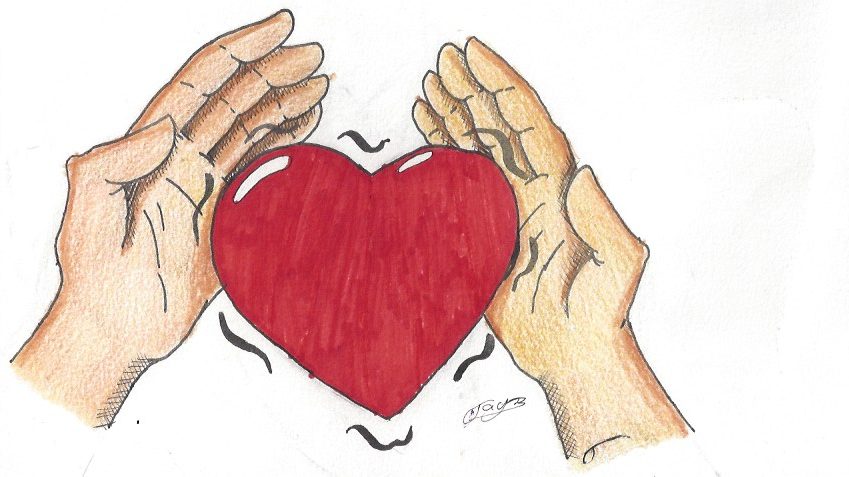The Cure for Humanity: Empathy
December 2, 2019
Power is arguably the most desirable thing in the world. From power comes influence, fame, and sometimes fortune. Some of the most powerful forces in this world are invisible, such as gravity and magnetism. Other forces—human forces—can be equally, and sometimes more powerful. Perhaps, the greatest of these forces is our defining human characteristic: empathy.
All living things, from the smallest atom to the largest elephant, share at least one similarity: the fight for survival. Our most primal instincts tell us to take care of ourselves and to ensure the survival of the next generation. The thing that differentiates humans from the common house cat or the buzzing bee, however, is not the opposable thumb we possess, our two legs, or the hair on our heads. Our capacity to experience complex emotions and express them in various ways makes us human.
No other animal can create art or utilize language to convey emotion. Humanity recognizes itself as the most superior species on earth, made in a godlike image. But today I look around and see a human race retreating to their primal state. Our concerns extend only to ourselves and our beliefs are justified by our limited experiences and struggles. Our instincts say, “fend for yourself and you’ll be just fine.”
With a world that seemingly dismisses empathy for comfort, our future seems bleak. Real people suffer from important issues everyday, and we don’t talk about it enough. While the US in particular has made great strides towards establishing equity for all, it seems that hate and complacency are on at all-time high. According to the FBI, in 2018 hate crimes reached a 16-year high. A hate crime is defined by the FBI as a “criminal offense against a person or property, motivated in whole or in part by an offender’s bias against a race, religion, disability, sexual orientation, ethnicity, gender, or gender identity.”
In acknowledging this statistic as a reflection of our world’s state, I wonder if people have any concept of empathy.
American post-harcore band La Dispute once said,”The greatest cruelty is our casual blindness to the despair of others.”
The first amendment grants us the right to our own opinion. This right mustn’t ever be diminished, as it defines our unique democracy. But being as we live in new age, we have an obligation to be mindful of diversity. For how can we live our lives and express our opinions at the expense of others’ suffering?
To deny that the reality of social issues, to claim them as a charade of the media or a group’s effort to victimize themselves, is a blatant denial of facts. To dismiss these things as “not my problem” reveals a fatal flaw in humankind. In doing so, we reject the very thing that makes us unique and in turn reduce ourselves to machines of survival.
Caring only for ourselves is the easier, more confortable choice: hence, the reasoning for this choice. Advocacy for others will always receive glares, questions, and confusion. Empathy allows us to relate to our fellow human, to dig deep into our souls and find the piece of our heart that can understand something that we all experience regardless of race, religion, or any difference: pain.
The minimization of human pain is not an easy task, but easy paths have very rarely yielded great outcomes.
The US didn’t gain independence through complacency and acceptance of mistreatment. The abolition of American slavery was not accomplished through the means of sitting around. Women didn’t gain the right to vote by accepting what was socially acceptable.
While it seems like so many of the world’s problems are fixable with a little more empathy, I realize that things are much more complex than they appear. It’s naive to think that all problems will disappear if we all just love each other more.
People are set in their ways, on all sides of whatever political spectrum in reference. The problems of humanity are as complex as the emotions we experience. Complex problems demand complex solutions. Open-mindedness is a spectrum for all to consider and therefore as a self-proclaimed progressive, I mustn’t be a hypocrite and dismiss ideas that I might disagree with. If I condemn intolerance, then aren’t I intolerant? Is my form of intolerance justified because it prevents the proliferation of hateful ideas into potentially dangerous action? I don’t have the answers to these questions just yet, but I’ve come to the conclusion that strength in the face of adversity doesn’t require hate.
I don’t claim to have all the answers. No one does. In our 21st century search for these answers, however, we must open our hearts, minds, and souls to the experiences of others and incorporate them into our beliefs. The impact of empathy goes a long way, and significant change is the result of all the minor changes along the way. As humans, it is our responsibility to embrace our greatness, and the first step towards that is through embracing empathy.

